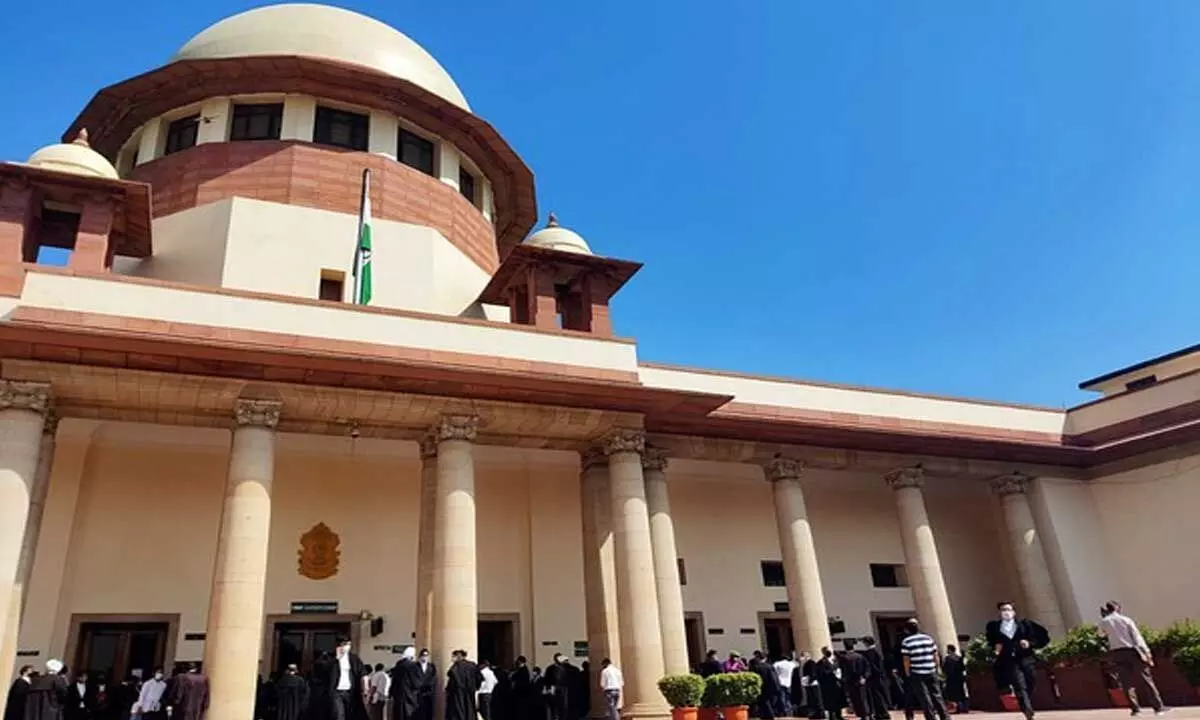Live
- Ex-diplomat discovers Amritsar’s dark side while translating his grandfather’s book
- Embracing the art of unlearning: A path to professional growth
- Vanamamalai Mutt Jeeyar offers prayers at Tirumala temple
- JD(S) MP Prajwal Revanna Denies Authenticity Of Alleged "Obscene Videos
- Indian hospitality sector primed for strong rebound in 2024, presents investment opportunities
- Speeding Jaguar Collides With Cab In Delhi: Three Injured, Admitted To AIIMS
- AP BJP Chief Spokesperson Lanka Dinakar flays Botsa over Vizag Railway Zone
- Congress Leader Arvinder Singh Lovely Resigns Over AAP Alliance
- Art: A therapy for stress relief and promoting creativity
- Tirupati: Strictly monitor sales, illegal storage of liquor says Collector Pravin Kumar
Just In
'To intimidate, harass and disturb normal functioning', Chhattisgarh moves Supreme Court challenging PMLA

Supreme Court of India
The Chhattisgarh government on Wednesday moved the Supreme Court challenging the constitutional validity of Prevention of Money Laundering Act (PMLA)
New Delhi: The Chhattisgarh government on Wednesday moved the Supreme Court challenging the constitutional validity of Prevention of Money Laundering Act (PMLA), saying that the central investigation agencies are being misused by those in power in order to intimidate, harass and disturb the normal functioning of an opposition government in Chhattisgarh.
Senior advocate Mukul Rohatgi and advocate Sumeer Sodhi, representing the Chhattisgarh government, submitted before a bench headed by Chief Justice D.Y. Chandrachud and comprising Justice P.S. Narasimha that the issue is of constitutional importance and urged the court to grant urgent hearing in the matter.
The bench said it will take up the matter on May 4.
Chhattisgarh has filed the original suit challenging the law under Article 131 of the Constitution which empowers a state to move the apex court directly in matters of dispute with the Central government or any other state.
The state government, which is first to challenge the PMLA and its provisions, said that several complaints are being received by it on behalf of its officials as well as the residents of the state to the effect that ED is "torturing, abusing, and manhandling" them in the garb of conducting a probe.
"The present case is a perfect example of how the Central investigation agencies are being misused by those in power in order to intimidate, harass and disturb the normal functioning of an opposition Government in the State of Chhattisgarh," it said.
In the suit, the Bhupesh Baghel government said: "It is due to this blatant and excessive misuse of powers that the plaintiff state is being forced to approach this court. It is imperative to state that this is not the first occasion wherein the ED has resorted to an illegal modus operandi. On multiple occasions, the aforementioned approach has been employed concerning various states that hold a political stance opposite to the one in power at the Centre."
The state said such conduct amounts to a severe misappropriation and arbitrary use of power, which goes against the constitutional mandate and investigative agencies are expected to be entirely independent and uninfluenced.
It said that it is seeking interference of the court under its original jurisdiction bestowed by virtue of Article 131 of the Constitution, in light of a dispute that has arisen between the state and defendants -- Union of India, state of Karnataka and Directorate of Enforcement (ED) - which involves questions of law and facts affecting its legal and constitutional rights.
The state said that a FIR was registered at police station Kadugodi of Bengaluru against Suryakant Tiwari for offenses punishable under various sections of IPC including assault or criminal force to deter public servant from discharging his duty and destruction of evidence.
"The complainant in the FIR is Income Tax Department official and the allegation pertains to alleged illegal collection on levy of coal as well as attempts to influence public servants through corrupt and illegal means in the State of Chhattisgarh," said the state's suit.
The state government, in the suit, said that the ED on the basis of the predicate offense, registered an ECIR dated September 29, 2022 and started conducting its investigation.
"The said investigation has resulted in indiscriminate surveys and raids at various Departments and Offices of the state government, and arrests of Ssate officials," it said.
The suit said, "Karnataka Police has no jurisdiction to register the FIR; if registered on the basis of commission of a cognisable offense, the FIR must be forthwith transferred to the Police which has the jurisdiction to investigate the FIR."
The suit said "public order" and "police" are state subjects under Seventh Schedule List II, Entries 1 and 2 and the act of allowing one state to register and sit over an FIR for an offense that admittedly took place in another state violates constitutional federalism and autonomy of a state.
"The case of the Plaintiff State is that the said FIR was lodged maliciously in Karnataka by a Central Agency being the Informant, solely with the aim of facilitating the registration of ECIR by ED, so as to disrupt the smooth functioning of the Government in the Plaintiff State," it said.
It said that ECIR registered by the ED deserves to be quashed as the predicate offense is not registered by the jurisdictional Police and the said registration of the case by ED is ex-facie in teeth of law laid down by this court in its last year, verdict on validity of various provisions of PMLA in the case of Vijay Madanlal Choudhary versus Union of India.
"To name a few, the Environment Conservation Board (CECB), Labour Commission, Commissioner of State Tax, Chhattisgarh, Commercial Tax-GST Department, and Commissioner of State Tax have been searched under the guise of an FIR registered by Karnataka Police," it said.

© 2024 Hyderabad Media House Limited/The Hans India. All rights reserved. Powered by hocalwire.com






